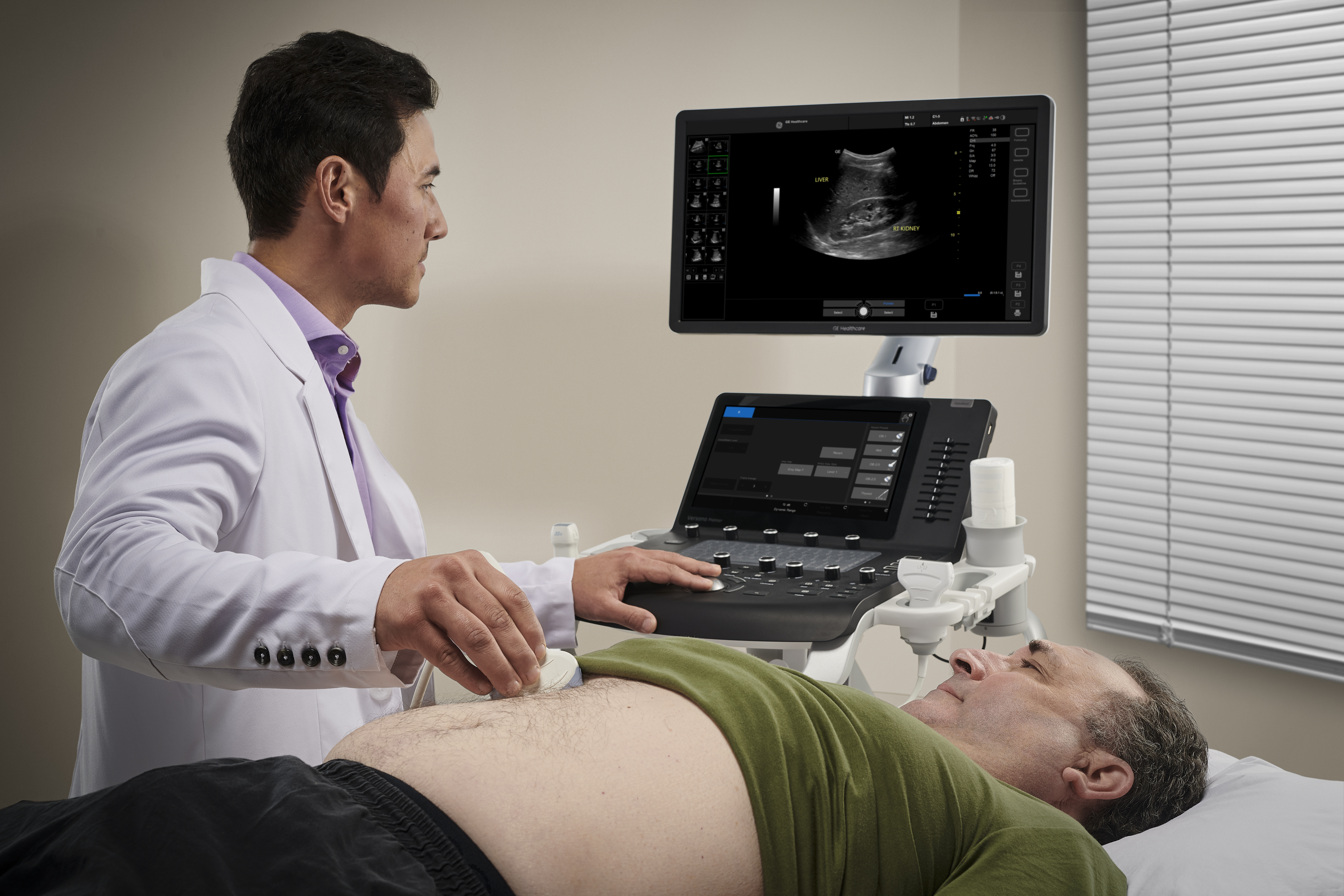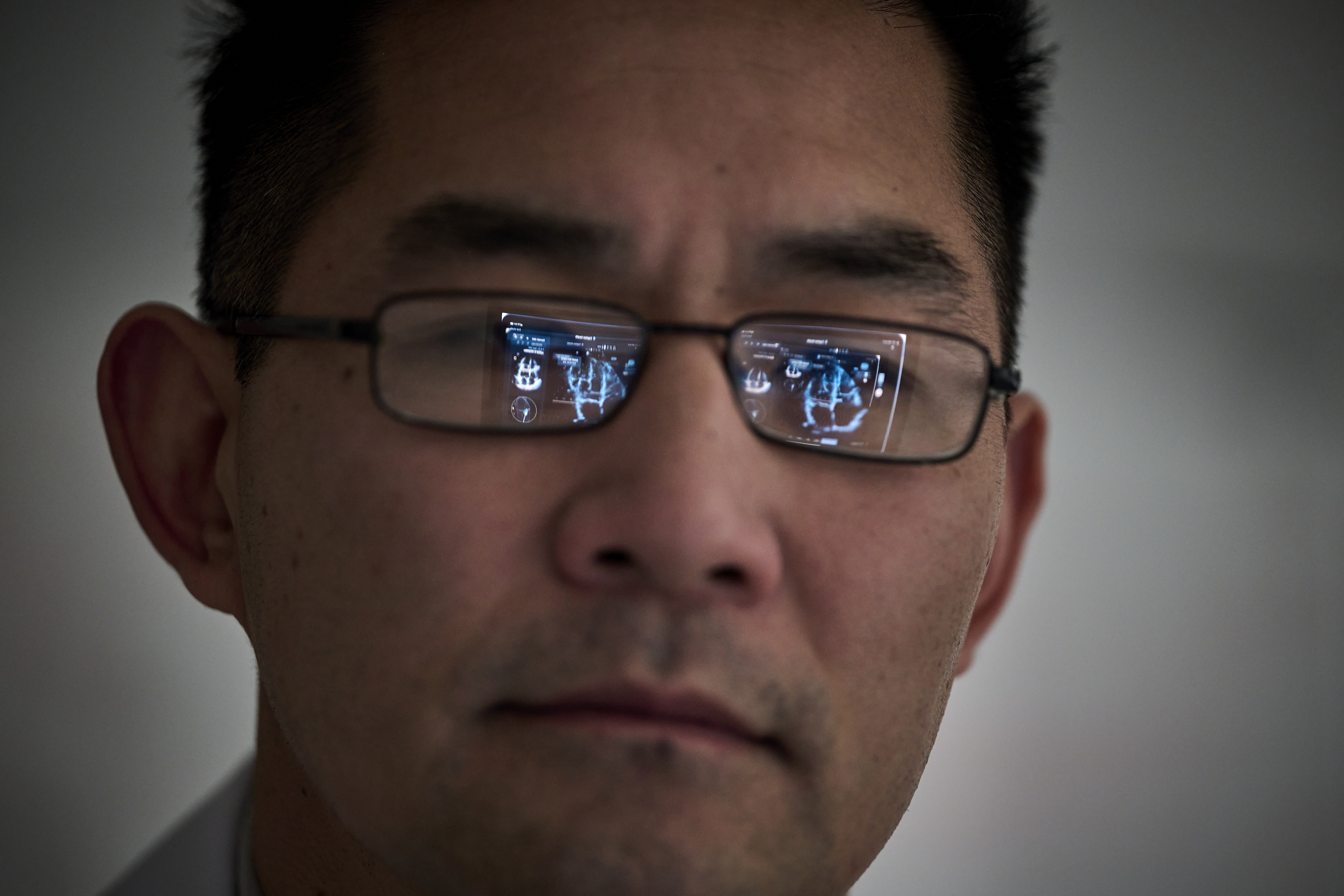As artificial intelligence (AI) continues its rapid evolution, affecting virtually every area of life, healthcare is feeling its impact even quicker and more acutely. Twenty percent of clinicians, representing most areas of specialization, already integrate AI into their diagnostic practices, their treatment approaches, and even their administrative workflow, and the number grows each day.1 Whether you're a general practitioner (GP) who is brand-new to ultrasound or you are looking to enhance your current AI integration, let's explore some of the ways AI is currently working with clinicians to boost efficiency.
AI ultrasound and other testing applications comprise some of the fastest-growing areas of AI adoption in healthcare. In the UK's National Health Service, nearly 35% of all AI utilization is applied to diagnostic practices.2 Further, over three-quarters of European radiologists trust AI algorithms to accurately diagnose patients.3 Data from the University of Massachusetts indicates AI-empowered ultrasonography has the potential to further accelerate the use of medical ultrasound in various clinical settings, with broad usage by medical personnel.4
GPs, who are among the fastest-growing groups of clinicians seeking to adopt ultrasound into their practice or improve their current infrastructure, must overcome barriers to effective use, such as learning curves, personnel shortages, and resource limitations. Since approval of the first AI ultrasound software by the Food and Drug Administration (FDA) in 2016,5 AI and machine learning have gone on to positively impact the process in abdominal imaging, cardiac care, obstetrics and gynecology, musculoskeletal medicine, and many other clinical areas.
Informed and driven by human clinical expertise and operation, the continued evolution of AI will help GPs fold ultrasound into their scope of care by facilitating optimal image quality, as well as improving scan positioning and completion, data storage and transfer, and other aspects of ultrasound imaging. Growing pains are a factor and practitioners must temper utilization with responsible, ethical application and philosophy. AI can help GPs perform scans more quickly and reliably, saving clinical and operational time and effort, and it can even simplify and expedite billing and reporting. AI can be instrumental in helping even novice users become more adept and confident in ultrasound utilization.
AI's impact on user experience for primary care ultrasound
The core function of AI is to ease human operation. Machine learning and predictive algorithms expedite and enhance processes, but also allow for personalization features that help flatten the learning curve among general practitioners embracing primary care ultrasound.
Ultrasound training for GPs consists of isolated courses and education modules, which may not adequately consider continued independent learning. AI can provide continuous feedback, facilitating ongoing learning and optimal expertise in a sort of "on-the-job" training for new and less experienced users. Artificial intelligence features in primary care ultrasound systems can give the user immediate actionable feedback, to improve quality, help direct positioning, and intuitively guide users to clearer and more confident scans.6 While the addition of primary care ultrasound can help GPs grow their practice immediately, the integration of AI creates something of a lower-pressure "safety net," permitting gradual learning and muting the expectation of immediate expertise that may discourage adoption.7
In addition to "on-the-spot" and bedside assistance, AI ultrasound in primary care allows for faster and more intuitive scan preparation. Automated preset tools and machine-learning features offer expedited, personalized, and informed settings for each patient and specialization. AI can even automate basic features, like screen capture, for more accessible and immediate scan comparison, storage, and transfer.
Increased diagnostic confidence and image clarity
Artificial intelligence may also enhance image quality. Algorithms are making scans clearer and easier to read, which helps newer users gain diagnostic confidence and create better-informed care plans.8
AI can help guide probes in situations where less-experienced users struggle to identify corresponding anatomy; it can also recognize relevant plane positioning and even simplify annotation, measurements, and labeling. Multiple specializations—including but not limited to cardiac, gallbladder, kidney, liver, and abdominal care—are integrating these tools, which can help general practitioners expand more into these specialty areas.
An ideal solution for resource-limited environments
AI is making a genuine impact in the daily lives of GPs who recognize the immense value of primary care ultrasound but feel they lack the resources and personnel for proper implementation. AI-enabled plane recognition, scan capture, labeling, automation of data entry tasks, and many other features are helping smaller practices simplify processes and free up limited staff to focus on other aspects of patient care. Over 70% of healthcare leaders trust AI to support non-clinical, administrative tasks.9
A recent comprehensive international study revealed that AI-assisted pulmonary ultrasound in resource-limited environments could help non-expert clinicians interpret lung ultrasound features more accurately, quickly, and confidently.10 The study's custom-built AI tool used continuous real-time prediction, time-to-interpret, and other AI-supported features during the course of analysis.
General practitioners considering the promise of primary care ultrasound may have concerns regarding burnout, staffing shortages, or steep learning curves historically associated with adoption. AI-focused benefits can help address these issues every step of the way, providing informed assistance during scanning as well as a more forgiving and flexible learning experience, simplifying tedious workflow tasks that can leave staff feeling confused, dissatisfied, and discouraged.
In terms of global benefits, over 95% of healthcare executives believe AI is important for health equity.10 Maternal and child mortality, infectious disease, and a variety of other largely preventable health crises often persist due to staffing and resource shortages in low-to-middle-income facilities.11 Cost-effective, AI-enabled primary care ultrasound allows GPs serving these populations to incrementally reverse this trend: easier and more intuitive operation can lead to quicker and more confident medical care.
Consider AI an assistant, not a replacement
The prospect of advances in artificial intelligence has polarized the globe, with many voicing valid concerns regarding over-reliance, particularly in the healthcare landscape, where daily, literal life-and-death decisions and data security issues maximize the stakes.
It's important to realize that, specifically in ultrasound and other diagnostic areas, an experienced human clinician should guide even the most rudimentary use of AI, providing context, helping it learn, taking corrective action against errors, and more. AI will not replace trained, experienced clinicians. Rather, this clinical tool will augment the quality, speed, and reliability of care, expedite learning, and level the playing field for novice users, creating more experts more quickly.12
Leveraging AI-supported primary care ultrasound for your practice
As a general practitioner, you may be torn between recognizing and embracing the value of primary care ultrasound and avoiding it because of perceived obstacles and difficulty of integration. AI-enabled primary care ultrasound helps your practice grow its scope of care while shrinking the time spent on administrative tasks. It has the potential to help even the leanest practices fully realize their expansion potential, serve more patients, increase revenue, and improve clinician satisfaction. In other words, AI can be a game-changer for your corner of the healthcare world.
Learn more about ultrasound for primary care and AI-enabled ultrasound solutions.
REFERENCES:
- Grandview Research. Artificial intelligence In healthcare market size, share, and trends analysis report by component (software solutions, hardware, services), by application (virtual assistants, connected machines), by region, and segment forecasts, 2023 - 2030. (n.d.). https://www.grandviewresearch.com/industry-analysis/artificial-intelligence-ai-healthcare-market
- Desk F, & Desk F. Artificial intelligence and the future of the NHS. Health Tech World. (2023, June 14). https://www.htworld.co.uk/news/ai/artificial-intelligence-and-the-future-of-the-nhs-red23/
- Becker C et al. (2022). Current practical experience with artificial intelligence in clinical radiology: a survey of the European Society of Radiology. Insights Into Imaging. 2022;13(1). https://doi.org/10.1186/s13244-022-01247-y
- Kim YH. Artificial intelligence in medical ultrasonography: driving on an unpaved road. Ultrasonography. 2021;40(3), 313–317. https://doi.org/10.14366/usg.21031
- Beacher, F. & Informa Tech. (n.d.). [Ultrasound and AI – Where are We?]. Journal of the British Medical Ultrasound Society. https://www.bmus.org/static/uploads/resources/Ultrasound_and_AI__Where_are_We.pdf
- Jercich K. How AI can increase the effectiveness of point-of-care ultrasounds. Healthcare IT News. 2022, May 2. https://www.healthcareitnews.com/news/how-ai-can-increase-effectiveness-point-care-ultrasounds
- Holländer B. How AI can help transform medical ultrasound imaging. Medium. 2021, December 15. https://towardsdatascience.com/how-medical-ultrasound-may-become-the-preferred-imaging-method-with-ai-323a689a1997
- "AI Survey: Health Care Organizations Continue to Adopt Artificial Intelligence to Help Achieve Better, More Equitable and Affordable Patient Outcomes." Optum. Accessed November 9, 2023. https://www.optum.com/about-us/news/page.hub.ai-survey-health-care-organizations-adopt-artificial-intelligence.html.
- Nhat PTH et al. (2023). Clinical benefit of AI-assisted lung ultrasound in a resource-limited intensive care unit. Critical Care. 2023;27(1). https://doi.org/10.1186/s13054-023-04548-w
- Gomes RG. AI system for fetal ultrasound in low-resource settings. arXiv.org. 2022, March 18. https://arxiv.org/abs/2203.10139
- AI survey: health care organizations continue to adopt artificial intelligence to help achieve better, more equitable and affordable patient outcomes. Optum. (n.d.). https://www.optum.com/about-us/news/page.hub.ai-survey-health-care-organizations-adopt-artificial-intelligence.html.
- Talley A. AI's transformative impact: ultrasound education. American Registry for Diagnostic Medical Sonography. ARDMS. 2020, April 28. https://www.ardms.org/ai-and-ultrasound-education/#:~:text=AI%20won%27t%20replace%20sonographers,it%20will%20certainly%20be%20disruptive.


